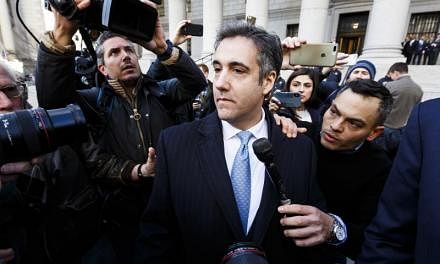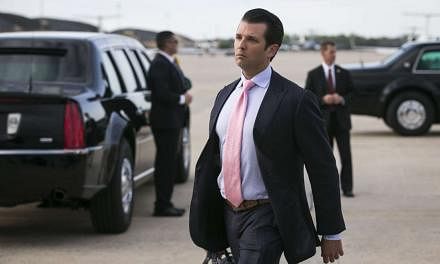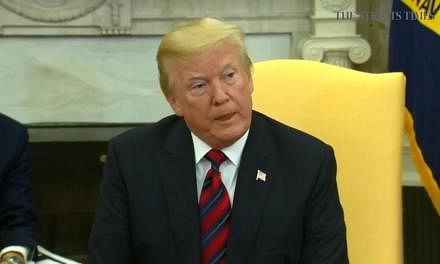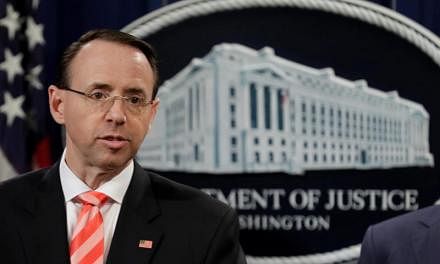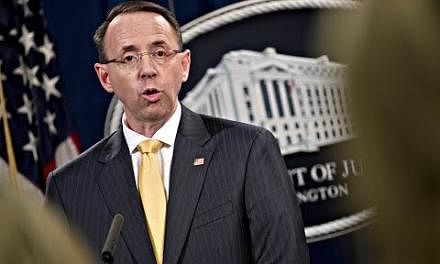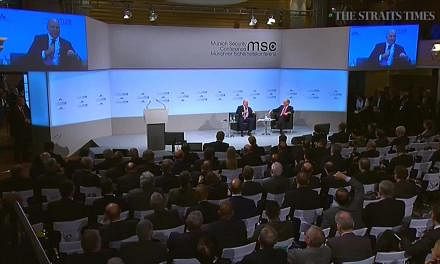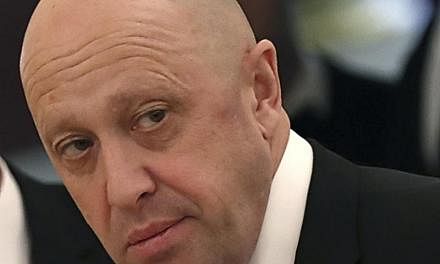WASHINGTON (WASHINGTON POST) - Since President Donald Trump abruptly fired FBI director James Comey last week, concern from both political parties has mounted about the selection of a replacement and the president's suggestion that he may have secretly taped conversations with the ousted director.
Key Republican and Democratic lawmakers on Sunday (May 14) called for Trump to turn over any recorded conversations, based on a tantalizing tweet the president sent last week that said: "James Comey better hope that there are no 'tapes' of our conversations before he starts leaking to the press!"
"If there are any tapes of this conversation, they need to be turned over," Republican Senator Lindsey Graham told NBC's "Meet the Press," underscoring a strong bipartisan reaction to the suggestion of White House tapes.
Democrats continued on Sunday to call for appointment of a special prosecutor to handle the FBI investigation into whether Trump's campaign knew of Russian interference in the 2016 election. And after a parade of eight candidates appeared at the Justice Department for interviews, members of Congress began voicing their preferences for Comey's replacement.
After a week of turmoil, none of Trump's top aides appeared on the major Sunday morning news shows to defend and explain the president's decision. Host Chris Wallace opened "Fox News Sunday" by highlighting who was not on his guest list, saying that the White House would not make anyone available to discuss the Comey firing.
Trump slipped away to his private golf course in Virginia, where aides said he planned to make calls, have lunch and perhaps hit a few golf balls.
The bipartisan calls for more White House disclosures came as an NBC News-Wall Street Journal poll released Sunday found that just 29 per cent of Americans said they approve of Comey's firing; 38 per cent said they disapprove.
About 32 per cent of respondents said they didn't have enough information to answer. But among those who have been paying "a lot" of attention to the firing, 53 per cent said they disapprove; 33 per cent approved.
On Capitol Hill, where the House will return on Monday after a recess, members continued to disagree about the need for a special prosecutor to take over the Russia investigation. The inquiry was one of the triggers for Trump's displeasure with Comey, who he called a "showboat" seeking media attention.
On NBC, Graham dismissed calls for a special prosecutor or independent commission. "It's not a criminal investigation. I see no need for a special commission yet," he said.
But Senate Democratic Leader Charles Schumer told CNN that many Democratic senators support blocking Trump's nominee for FBI director until the Justice Department names a special prosecutor.
"We will have to discuss it as a caucus, but I would support that move, because who the FBI director is is related to who the special prosecutor is," Schumer said. noting that Warner, whose committee is also conducting a Russia probe, also supports a special prosecutor.
His threat to block Trump's pick may be a bit toothless: Republicans have 52 seats in the Senate, and a rules change made in 2013 by Democrats means that whoever Trump nominates requires a simple majority vote to be confirmed.
But the Democratic leader's comments signal that any Trump pick is likely to face a politically charged confirmation fight.
Most Republicans, including House Speaker Paul Ryan and other House and Senate leaders, oppose a special prosecutor.
But Republican Representative Lloyd Smucker, a first-term lawmaker, told a Rotary Club luncheon in his district last week that Trump's reasons for firing Comey raise "serious and legitimate questions about timing, intent and the integrity of ongoing investigations."
In the NBC/WSJ poll, 15 per cent of respondents said they prefer Congress to investigate Russia's election meddling, while 78 per cent supported an independent commission or special prosecutor.
The Senate expects to get more details about Comey's firing this week in a requested briefing from Deputy Attorney General Rod Rosenstein, whose memo to Attorney General Jeff Sessions said that "the FBI's reputation and credibility have suffered substantial damage" under Comey's leadership.
White House aides continue to cite the memo as a driving factor in the president's decision.
Republicans and Democrats agreed on one issue in Sunday interviews - the need to find out more about Trump's suggestion that he may have tapes of private conversations with Comey.
Trump and his aides have denied reports that the president asked Comey to pledge his loyalty and that the then-FBI director declined.
"I want loyalty to the country. I mean, I want loyalty to the United States of America. I want him to do a good job - or her - to do a great job," Trump said in an interview on Fox News late Saturday night.
Asked about a taping system in that interview, Trump said, "I won't talk about that. All I want is for Comey to be honest, and I hope he will be, and I'm sure he will be, I hope."
Republican Senator Mike Lee, a former federal prosecutor, said that "it's probably inevitable" such recordings would need to be handed over to Congress and predicted that they would be subpoenaed.
Asked on "Fox News Sunday" about Trump's decision to set up a taping system, Lee called it "not necessarily the best idea."
Schumer said that if such tapes exist, "the president should turn them over immediately."
"To destroy them would be a violation of law. But he should turn them over to Congress and to the investigators," Schumer told CNN's "State of the Union." "If there are no tapes, he should apologise to both Jim Comey and the American people for misleading them."
Appearing on ABC's "This Week," Senator Mark Warner, the top Democrat on the Senate Select Committee on Intelligence, said his panel or another congressional committee "absolutely" would subpoena Trump for any recordings.
"We have got to make sure that these tapes, if they exist, don't mysteriously disappear," Warner said.
Rosenstein, who is overseeing the Justice Department's Russia probe, has not signalled that he plans to appoint an independent investigator.
On Saturday, Sessions and Rosenstein interviewed eight people for the FBI director job, including Senator John Cornyn; acting FBI director Andrew McCabe; New York State Court of Appeals Judge Michael Garcia; Alice Fisher, who previously led the Department of Justice's criminal division; former congressman Mike Rogers, a former FBI agent; and Frances Townsend, who served as President George W. Bush's homeland security adviser and is a CBS News contributor.
The next FBI director "should be not a partisan politician, not part of either party," Schumer told CNN.
Lee said Trump should nominate Judge Merrick Garland, chief judge of the US Court of Appeals for the District of Columbia, to lead the FBI. Garland was former president Barack Obama's nominee to replace the late Supreme Court Justice Antonin Scalia, but Republicans blocked the nomination last year to allow Obama's successor to make the choice.
Also appearing on Fox News, Josh Holmes, a top outside political adviser to Senate Majority Leader Mitch McConnell - who orchestrated the year-long blockade of Garland - said that the Senate leader also would support Garland's nomination to the FBI post.
Vice President Mike Pence and other senior Republicans have said they would back Garland. Privately, Democrats have expressed doubt that Garland would even consent to an interview for the job.

